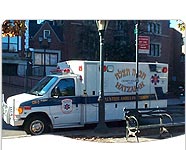 |
 
Bad Bee Stings - Reactions could be serious
By: Anne Thompson(HealthDayNews) -- The two greatest risks from insect stings are allergic reaction, which could be fatal,
and infection, which is more common and normally less serious.
If you've been stung by a bee, the University of Maryland Department of Medicine offers these suggestions:
Bees leave behind a stinger attached to a venom sac. Do not try to pull it out, as this may release more
venom. Gently scrape it out with a blunt-edged object, such as a credit card or dull knife. Wash the area with
soap and water. This should be done several times a day until the skin is healed.
Apply a cold or ice pack, wrapped in cloth for a few minutes. Apply a paste of baking soda and water and
leave it on for 15 to 20 minutes, or dab on a bit of household ammonia. Take acetaminophen for pain.
Seek immediate medical attention if you are stung in the mouth or nose, as swelling may block your airways.
Also, seek emergency care if you have any of these symptoms, because they indicate an allergic reaction:
• Large areas of swelling
• Abnormal breathing
• Tightness in throat or chest
• Dizziness
• Hives
• Fainting
• Nausea or vomiting
• Persistent pain or swelling
Copyright © 2004 ScoutNews, LLC. All rights reserved
Back to Safety Tips Index
|









